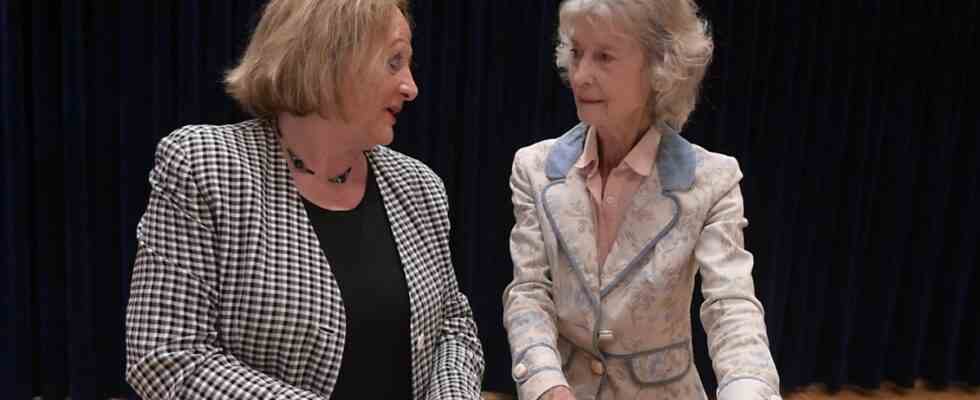Karamba Diaby wrote his doctoral thesis on allotment gardens in Halle and the heavy metal pollution there. Accepting the native Senegalese as German would probably never occur to a right-wing extremist or reactionary, despite this very “German” topic. The 60-year-old geoecologist and SPD politician, who came to the former GDR from West Africa in 1985 and has been a member of the Bundestag since 2013, is repeatedly the target of hatred and racism. In 2020, his campaign office in downtown Halle (Saale) was even shot at.
Diaby is one of ten politically or journalistically committed people with whom the former Justice Minister Sabine Leutheusser-Schnarrenberger (FDP) and her co-author Gunna Wendt spoke for their book “Our endangered democracy. How to deal with hatred and hate speech against politicians and journalists”. to have. The 70-year-old, who ran for the FDP for many years in the Starnberg constituency and was a member of the Bundestag from 1990 to 2013, has now presented the book, which was published in 2022, in the Grünwald library. Hate attacks and threats against politicians and other people in public have increased significantly over the past three or four years, whether online or in real life – in June 2019 Walter Lübke (CDU) was murdered by a right-wing extremist: “It is – unfortunately – a topical issue,” says Leutheusser-Schnarrenberger. “And it’s not a niche topic, it’s a real danger.”
At the political reading, which her aunt, the Grünwald historian and journalist Ulrike Leutheusser, helped organize, the Grande Dame of the Liberals showed her usual passionate and eloquent side. Leutheusser-Schnarrenberger not only made a name for herself because of her attitude when she resigned as Minister of Justice in 1996 because of the “big eavesdropping”, but is still very committed – in 2018 she became the first anti-Semitism commissioner for the state of North Rhine-Westphalia, and she is also a member of the Bavarian Constitutional Court.
In Grünwald she now read passages that describe the experiences of some of those she portrayed in the book. Diaby, for example, had to experience how the NPD took one of his campaign posters as an opportunity to comment scornfully on Facebook: “German people’s representatives according to today’s understanding of the SPD.” Below that, hatred and racism erupted against him in a number of comments. What Diaby then did, namely going on the offensive and posting (“To all racists: I am not your negroe”), impressed Leutheusser-Schnarrenberger: “Yes, publicity gives us a certain amount of protection.” She also showed this with other examples, such as that of Marian Offman, who sat on the Munich City Council for the CSU and SPD, and who was exposed to anti-Semitic hostilities because of his Jewish origins, but countered them with visible courage. Also touching (and outrageous) are the cases of Stefanie Kirchner (left), who, as a district councilor in Kösching, was the target of a politically motivated ambush, which could even have been fatal, and Belit Onay (green), who after his victory received a flood of hate mail after the mayoral election in Hanover. “That did something to me. I couldn’t enjoy the win at all,” he is quoted as saying. But he didn’t let that get him down.
Important support from the public
A representative democracy whose representatives are increasingly and openly attacked – two thirds of all German local politicians have already been victims of threatening letters – is endangered. That’s what drives Leutheusser-Schnarrenberger, it’s about “showing face”, also being awake as a civil society and giving active support. For those affected by hate, it is important to get encouragement from the population as a reaction, such as: “Don’t let yourself be intimidated!” or “Go on!”. Or to be re-elected like Karamba Diaby (he won the Bundestag direct mandate in 2021). Nevertheless, according to Leutheusser-Schnarrenberger, the “limits of what can be said” have been shifted, also due to the entry of the AfD into the Bundestag. In addition, the audacity of the insults and hate agitators, some of whom no longer shy away from giving real names and addresses, is increasing.
The subsequent discussion dealt with essential questions: The relationship between freedom and diversity of opinion and regulation and security: How defensive can (or must) an endangered democracy be, also and especially on the Internet and on other media fronts? That the Russian state media RT (formerly Russia Today) and Sputnik, which are considered propaganda tools, are now banned in the EU is probably justified. “But we really can’t like it: turn off the transmitter,” said Leutheusser-Schnarrenberger. The obligation to use real names on the Internet is neither enforceable nor desirable in autocratic states, where criticism can sometimes only be articulated anonymously.
She visibly enjoyed one or the other discussion with eleventh graders from the high school: the result was a stimulating exchange about digital echo chambers, media competence, transparency obligations of tech companies, IT ethics or the lack of competence of the police in the field of online crime. As the head of the library Gabriele Oswald said at the end: “I would have wished for a larger audience. But for tonight the rule is: more quality than quantity.”

